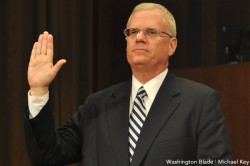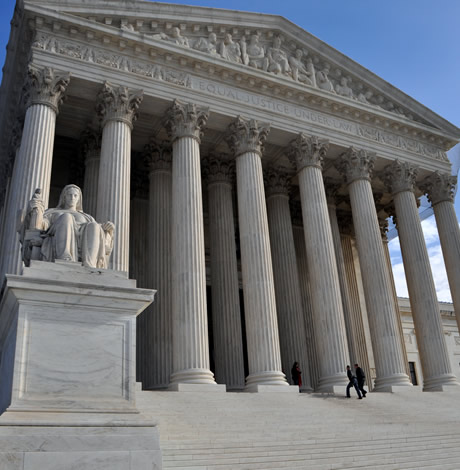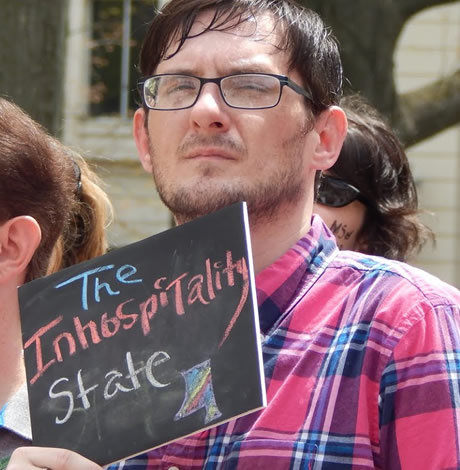National
Senate confirms gay nominee to Calif. federal court
Fitzgerald approved by vote of 91-6
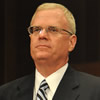
The Senate on Thursday confirmed to the bench a gay judicial nominee whom Republicans had held up for four months from receiving a floor vote along with other appointees.
Michael Fitzgerald, whom President Obama nominated for a seat on the U.S. District Court for the Central District of California in July, was approved by a vote of 91-6. A simple majority was required for confirmation.
The six senators who voted “no” were Roy Blunt (R-Mo.), Jim DeMint (R-S.C.), James Inhofe (R-Okla.), Mike Lee (R-Utah), Rand Paul (R-Ky.) and David Vitter (R-La.). Not voting were Sens. Lamar Alexander (R-Tenn.) and Orrin Hatch (R-Utah) as well as Mark Kirk (R-Ill.), who’s been recovering from a stroke.
“I am honored by the Senate’s confirmation vote today,” Fitzgerald said in a statement. “I am grateful to the President for my nomination. I am grateful to Senator Boxer for her recommendation of me to the President. I am grateful to Senator Feinstein for her support in the Senate Judiciary Committee. I look forward to serving the people of the Central District of California.”
The Senate Judiciary Committee reported out his nomination in November unanimously by voice vote to the Senate floor, but his confirmation has been held up along with other nominees.
Barbara Boxer (D-Calif.), who recommended the Fitzgerald nomination, spoke highly of him on the Senate floor prior to the vote as she chided Republicans for holding up his confirmation.
“He is an historic choice, and a vote of Mr. Fitzgerald’s nomination is long overdue, because he was voted out of the Senate Judiciary Committee unanimously 133 days ago, on Nov. 3, 2011,” Boxer said. “It really shouldn’t take this long to confirm such a highly-qualified nominee like Mr. Fitzgerald, especially because this seat has been designated a judicial emergency.”
According to Boxer’s office, former President George W. Bush’s district court nominees waited an average of 22 days as of March 2004 for confirmation after being reported out by the Judiciary Committee. Comparatively, President Obama’s district court nominees have waited an average of 93 days. Fitzgerald has waited 132 days for a vote on his nomination.
Fitzgerald was among 17 nominees pending before the Senate on which Senate Majority Leader Harry Reid (D-Nev.) filed cloture Monday as a result of Republicans objecting to floor votes on their confirmation. But as a result of a deal that was reached on Wednesday, Democrats and Republicans will move 12 district court judges and two circuit court judges through the confirmation process by May 7. Fitzgerald’s vote was locked in Thursday under the agreement.
LGBT advocates praised the confirmation of Fitzgerald and said his previous work over the years as an attorney makes him qualified for the position on the bench. Fitzgerald has had experience in private practice in addition to working as a U.S. attorney.
Chuck Wolfe, CEO of the Gay & Lesbian Victory Fund, said Fitzgerald’s legal experience “makes him an excellent choice for the federal bench.”
“He joins a still very small but growing group of openly LGBT federal judges, and we commend the Obama administration for making sure these esteemed positions are open to all qualified Americans, regardless of sexual orientation or gender identity,” Wolfe said.
Joe Solmonese, president of the Human Rights Campaign, said he applauds for the Senate for the confirming Fitzgerald — calling him “eminently qualified nominee” — as he took a jab at Republicans for holding up the nomination for so long.
“We are disappointed that it took months for the Senate to consider his nomination because Republican leadership has been refusing to give President Obama’s judicial nominees a timely up or down vote,” Solmonese said.
Michael Fleming, executive director of the David Bohnett Foundation and longtime friend of Fitzgerald’s, also had good things to say about the new judge upon his confirmation.
“I’ve known Michael for years and no one better embodies the qualities we seek to find in all of our judges — wisdom, honesty and integrity,” Fleming said. “There’s a reason why he was nominated by the president and why he has sailed through this process with such ease — because he has the skills and strengths to be a great judge.”
Lorri Jean, CEO of L.A. Gay & Lesbian Center, also said she’s known Fitzgerald for many years and believes he’ll serve the country with honor.
“I’m grateful to the President and the Senate for appointing a judge who brings to the bench not only a keen intellect, a wealth of legal experience and strong ethics, but life experience as a gay man,” Jean said. “It’s essential to have sexual orientation and gender identity diversity on the bench for the same reason it’s important to have racial and gender diversity in the judiciary; the life experience of judges provides valuable insight, and influences, their interpretation of the law. As Supreme Court Justice Sonia Sotomayor once said, ‘Personal experiences affect the facts that judges choose to see.’”
Congratulations also came from the White House.
“The president welcomes the confirmation of Michael Fitzgerald,” said White House spokesperson Shin Inouye. “He will serve the American people well on the U.S. District Court for the Central District of California.”
Fitzgerald was given a review by the American Bar Association, which gave him a rating of “unanimously well-qualified.”
Most recently, Fitzgerald worked at Corbin, Fitzgerald & Athey LLP in 1998, but prior to that experience, he worked at the Law Offices of Robert L. Corbin PC and at the law firm of Heller, Ehrman, White & McAuliffe.
The new judge also served as an assistant U.S. Attorney in Los Angeles, where he handled criminal cases, such as a drug and money laundering case involving what at that time was the second-largest cocaine seizure in California.
In his questionnaire response to the Senate Judiciary Committee, Fitzgerald wrote that he has participated in some LGNT activism, including the 2008 campaign against Proposition 8 as a door-knocker. Fitzgerald is also a member of the Harvard-Radcliffe Gay & Lesbian Caucus. From 2007 to 2008, he served on the leadership task force for the L.A. Gay & Lesbian Center. In the 1990s, he was a member of the Stonewall Democratic Club.
Fitzgerald isn’t a stranger to represent client in cases related to LGBT rights. He was involved in the settlement of Buttino v. FBI, the 1993 class-action lawsuit involving Frank Buttino, a gay FBI specialist who was anonymously outed to his superior, resulting in the removal of his security clearance and subsequent firing. Fitzgerald asked his law firm at the time to represent Buttino on a pro bono basis.
As a result of the settlement, the FBI renounced its prior policy of viewing homosexuality as a negative factor in regard to security clearances, the FBI agreed to hire an openly lesbian special agent and Buttino’s pension was restored.
Fitzgerald is the fourth out federal judicial nominee chosen by the White House, but third one to receive confirmation from the Senate. Fitzgerald’s confirmation makes him the first openly gay federal judge to serve in California.
In July, the Senate confirmed J. Paul Oetken to the U.S. District Court of Southern District of New York, making him the first openly gay male to sit on the federal judiciary. In October, the Senate confirmed lesbian Alison Nathan to the same court.
Another one of Obama’s gay judicial nominees, Edmund DuMont, was withdrawn after he asked the White House to remove him from consideration. DuMont was first nominated on April 14, 2010, but his nomination languished for more than 18 months without the taking Senate taking action. He was nominated the U S. Court of Appeals for the Federal Circuit and would have been the first openly gay federal appellate judge.
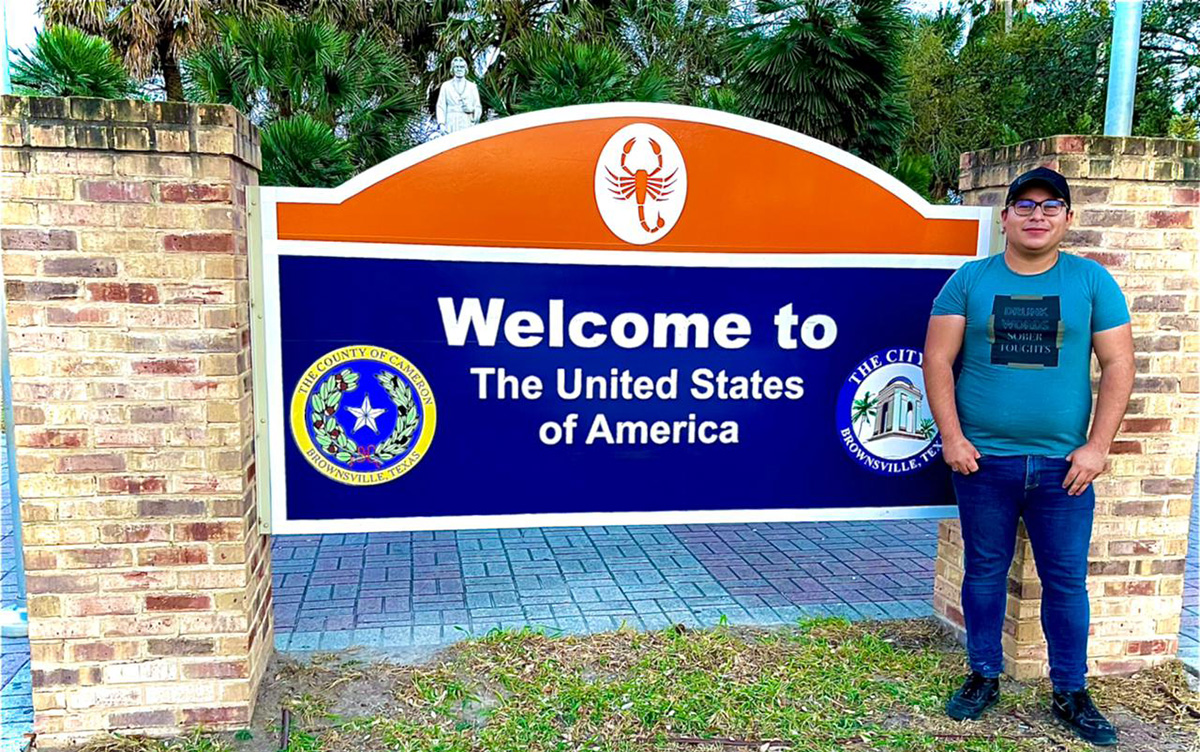
The U.S. has granted asylum to a Guatemalan LGBTQ activist who fled his country in 2019.
Estuardo Cifuentes and his partner ran a digital marketing and advertising business in Guatemala City.
He previously told the Washington Blade that gang members extorted from them. Cifuentes said they closed their business after they attacked them.
Cifuentes told the Blade that Guatemalan police officers attacked him in front of their home when he tried to kiss his partner. Cifuentes said the officers tried to kidnap him and one of them shot at him. He told the Blade that authorities placed him under surveillance after the incident and private cars drove past his home.
Cifuentes arrived in Matamoros, a Mexican border city that is across the Rio Grande from Brownsville, Texas, in June 2019. He asked for asylum in the U.S. based on the persecution he suffered in Guatemala because of his sexual orientation.
The Trump administration forced Cifuentes to pursue his asylum case from Mexico under its Migrant Protection Protocols program that became known as the “remain in Mexico” policy.
Cifuentes while in Matamoros ran Rainbow Bridge Asylum Seekers, a program for LGBTQ asylum seekers and migrants that the Resource Center Matamoros, a group that provides assistance to asylum seekers and migrants in the Mexican border city, helped create.
The Biden-Harris administration in January 2021 suspended enrollment in MPP. Cifuentes entered the U.S. on March 3, 2021.
“We are profoundly relieved and grateful that my husband and I have been officially recognized as asylees in the United States,” Cifuentes told the Blade on Monday in an email. “This result marks the end of a long and painful fight against the persecution that we faced in Guatemala because of our sexual orientation.”
Vice President Kamala Harris is among those who have said discrimination and violence based on sexual orientation are among the root causes of migration from Guatemala and other countries in Central America.
Cifuentes is now the client services manager for Lawyers for Good Government’s Project Corazón, a campaign that works “hard to reunite and defend the rights of families impacted by inhumane immigration policies.” He told the Blade he will continue to help LGBTQ asylum seekers and migrants.
“In this new chapter of our lives, we pledge to work hard to support others in similar situations and to contribute to the broader fight for the rights and acceptance of the LGBTQ+ migrant community,” said Cifuentes. “We are hopeful that our story will serve as a call to action to confront and end persecution based on gender identity and sexual orientation.”
U.S. Supreme Court
US Supreme Court rules Idaho to enforce gender care ban
House Bill 71 signed in 2023


BY MIA MALDONADO | The U.S. Supreme Court has allowed Idaho to enforce House Bill 71, a law banning Idaho youth from receiving gender-affirming care medications and surgeries.
In an opinion issued Monday, the U.S. Supreme Court granted the state of Idaho’s request to stay the preliminary injunction, which blocked the law from taking effect. This means the preliminary injunction now only applies to the plaintiffs involved in Poe v. Labrador — a lawsuit brought on by the families of two transgender teens in Idaho who seek gender-affirming care.
Monday’s Supreme Court decision enforces the gender-affirming care ban for all other trans youth in Idaho as the lawsuit remains ongoing in the Ninth Circuit Court of Appeals.

The American Civil Liberties Union and the ACLU of Idaho, both of whom represent the plaintiffs, said in a press release Monday that the ruling “does not touch upon the constitutionality” of HB 71. The groups called Monday’s ruling an “awful result” for trans Idaho youth and their families.
“Today’s ruling allows the state to shut down the care that thousands of families rely on while sowing further confusion and disruption,” the organizations said in the press release. “Nonetheless, today’s result only leaves us all the more determined to defeat this law in the courts entirely, making Idaho a safer state to raise every family.”
Idaho Attorney General Raúl Labrador in a press release said the state has a duty to protect and support all children, and that he is proud of the state’s legal stance.
“Those suffering from gender dysphoria deserve love, support and medical care rooted in biological reality,” Labrador said. “Denying the basic truth that boys and girls are biologically different hurts our kids. No one has the right to harm children, and I’m grateful that we, as the state, have the power — and duty — to protect them.”
Recap of Idaho’s HB 71, and what led to SCOTUS opinion
Monday’s Supreme Court decision traces back to when HB 71 was signed into law in April 2023.
The law makes it a felony punishable for up to 10 years for doctors to provide surgeries, puberty-blockers and hormones to trans people under the age of 18. However, gender-affirming surgeries are not and were not performed among Idaho adults or youth before the bill was signed into law, the Idaho Capital Sun previously reported.
One month after it was signed into law, the families of two trans teens sued the state in a lawsuit alleging the bill violates the 14th Amendment’s guarantee of equal protection under the law.
In late December, just days before the law was set to take effect in the new year, U.S. District Judge B. Lynn Winmill blocked the law from taking effect under a preliminary injunction. In his decision, he said he found the families likely to succeed in their challenge.
The state of Idaho responded by appealing the district court’s preliminary injunction decision to the Ninth Circuit, to which the Ninth Circuit denied. The state of Idaho argued the court should at least enforce the ban for everyone except for the plaintiffs.
After the Ninth Circuit’s denial, the Idaho Attorney General’s Office in February sent an emergency motion to the U.S. Supreme Court, the Idaho Press reported. Monday’s U.S. Supreme Court decision agrees with the state’s request to enforce its ban on trans health care for minors, except for the two plaintiffs.
******************************************************************************************

Mia Maldonado joined the Idaho Capital Sun after working as a breaking news reporter at the Idaho Statesman covering stories related to crime, education, growth and politics. She previously interned at the Idaho Capital Sun through the Voces Internship of Idaho, an equity-driven program for young Latinos to work in Idaho news. Born and raised in Coeur d’Alene, Mia moved to the Treasure Valley for college where she graduated from the College of Idaho with a bachelor’s degree in Spanish and international political economy.
******************************************************************************************
The preceding piece was previously published by the Idaho Capital Sun and is republished with permission.
The Idaho Capital Sun is the Gem State’s newest nonprofit news organization delivering accountability journalism on state politics, health care, tax policy, the environment and more.
We’re part of States Newsroom, the nation’s largest state-focused nonprofit news organization.
Kansas
Kansas governor vetoes ban on health care for transgender youth
Republican lawmakers have vowed to override veto
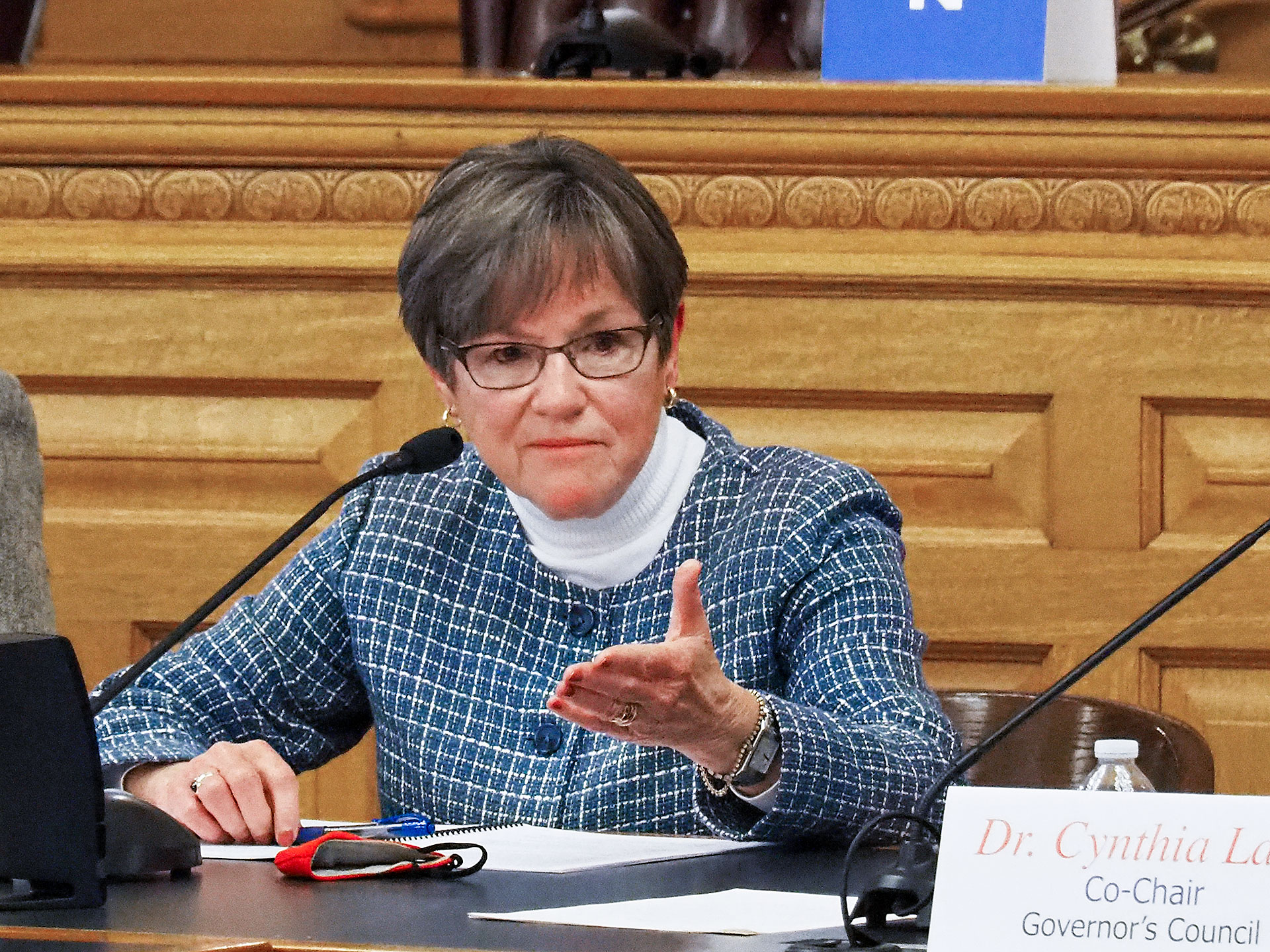

BY TIM CARPENTER | Gov. Laura Kelly flexed a veto pen to reject bills Friday prohibiting gender identity health care for transgender youth, introducing a vague crime of coercing someone to have an abortion and implementing a broader survey of women seeking abortion that was certain to trigger veto override attempts in the Republican-led House and Senate.
The decisions by the Democratic governor to use her authority to reject these health and abortion rights bills didn’t come as a surprise given her previous opposition to lawmakers intervening in personal decisions that she believed ought to remain the domain of families and physicians.
Kelly said Senate Bill 233, which would ban gender-affirming care for trans minors in Kansas, was an unwarranted attack on a small number of Kansans under 18. She said the bill was based on a politically distorted belief the Legislature knew better than parents how to raise their children.
She said it was neither a conservative nor Kansas value to block medical professionals from performing surgery or prescribing puberty blockers for their patients. She said stripping doctors of their licenses for serving health interests of patients was wrong. Under the bill, offending physicians could be face lawsuits and their professional liability insurance couldn’t be relied on to defend themselves in court.
“To be clear, this legislation tramples parental rights,” Kelly said. “The last place that I would want to be as a politician is between a parent and a child who needed medical care of any kind. And, yet, that is exactly what this legislation does.”
Senate President Ty Masterson (R-Andover) and House Speaker Dan Hawkins (R-Wichita) responded to the governor by denouncing the vetoes and pledging to seek overrides when legislators returned to the Capitol on April 26. The trans bill was passed 27-13 in the Senate and 82-39 in the House, suggesting both chambers were in striking distance of a two-thirds majority necessary to thwart the governor.
“The governor has made it clear yet again that the radical left controls her veto pen,” Masterson said. “This devotion to extremism will not stand, and we look forward to overriding her vetoes when we return in two weeks.”
Cathryn Oakley, senior director of the Human Rights Campaign, said the ban on crucial, medically necessary health care for trans youth was discriminatory, designed to spread dangerous misinformation and timed to rile up anti-LGBTQ activists.
“Every credible medical organization — representing over 1.3 million doctors in the United States — calls for age-appropriate, gender-affirming care for transgender and nonbinary people,” Oakley said. “This is why majorities of Americans oppose criminalizing or banning gender-affirming care.”
Abortion coercion
Kelly also vetoed House Bill 2436 that would create the felony crime of engaging in physical, financial or documentary coercion to compel a girl or woman to end a pregnancy despite an expressed desire to carry the fetus to term. It was approved 27-11 in the Senate and 82-37 in the House, again potentially on the cusp of achieving a veto override.
The legislation would establish sentences of one year in jail and $5,000 fine for those guilty of abortion coercion. The fine could be elevated to $10,000 if the adult applying the pressure was the fetuses’ father and the pregnant female was under 18. If the coercion was accompanied by crimes of stalking, domestic battery, kidnapping or about 20 other offenses the prison sentence could be elevated to 25 years behind bars.
Kelly said no one should be forced to undergo a medical procedure against their will. She said threatening violence against another individual was already a crime in Kansas.
“Additionally, I am concerned with the vague language in this bill and its potential to intrude upon private, often difficult, conversations between a person and their family, friends and health care providers,” the governor said. “This overly broad language risks criminalizing Kansans who are being confided in by their loved ones or simply sharing their expertise as a health care provider.”
Hawkins, the House Republican leader, said coercion was wrong regardless of the circumstances and Kelly’s veto of the bill was a step too far to the left.
“It’s a sad day for Kansas when the governor’s uncompromising support for abortion won’t even allow her to advocate for trafficking and abuse victims who are coerced into the procedure,” Hawkins said.
Emily Wales, president and CEO of Planned Parenthood Great Plains Votes, said HB 2436 sought to equate abortion with crime, perpetuate false narratives and erode a fundamental constitutional right to bodily autonomy. The bill did nothing to protect Kansas from reproductive coercion, including forced pregnancy or tampering with birth control.
“Planned Parenthood Great Plains Votes trusts patients and stands firmly against any legislation that seeks to undermine reproductive rights or limit access to essential health care services,” Wales said.
Danielle Underwood, spokeswoman for Kansas for Life, said “Coercion Kelly” demonstrated with this veto a lack of compassion for women pushed into an abortion.
The abortion survey
The House and Senate approved a bill requiring more than a dozen questions be added to surveys of women attempting to terminate a pregnancy in Kansas. Colorful debate in the House included consideration of public health benefits of requiring interviews of men about reasons they sought a vasectomy birth control procedure or why individuals turned to health professionals for treatment of erectile dysfunction.
House Bill 2749 adopted 81-39 in the House and 27-13 in the Senate would require the Kansas Department of Health and Environment to produce twice-a-year reports on responses to the expanded abortion survey. The state of Kansas cannot require women to answer questions on the survey.
Kelly said in her veto message the bill was “invasive and unnecessary” and legislators should have taken into account rejection in August 2022 of a proposed amendment to the Kansas Constitution that would have set the stage for legislation further limiting or ending access to abortion.
“There is no valid medical reason to force a woman to disclose to the Legislature if they have been a victim of abuse, rape or incest prior to obtaining an abortion,” Kelly said. “There is also no valid reason to force a woman to disclose to the Legislature why she is seeking an abortion. I refuse to sign legislation that goes against the will of the majority of Kansans who spoke loudly on Aug. 2, 2022. Kansans don’t want politicians involved in their private medical decisions.”
Wales, of Planned Parenthood Great Plains Votes, said the bill would have compelled health care providers to “interrogate patients seeking abortion care” and to engage in violations of patient privacy while inflicting undue emotional distress.
Hawkins, the Republican House speaker, said the record numbers of Kansas abortions — the increase has been driven by bans or restrictions imposed in other states — was sufficient to warrant scrutiny of KDHE reporting on abortion. He also said the governor had no business suppressing reporting on abortion and criticized her for tapping into “irrational fears of offending the for-profit pro-abortion lobby.”
******************************************************************************************

Tim Carpenter has reported on Kansas for 35 years. He covered the Capitol for 16 years at the Topeka Capital-Journal and previously worked for the Lawrence Journal-World and United Press International.
The preceding story was previously published by the Kansas Reflector and is republished with permission.
******************************************************************************************
The Kansas Reflector is a nonprofit news operation providing in-depth reporting, diverse opinions and daily coverage of state government and politics. This public service is free to readers and other news outlets. We are part of States Newsroom: the nation’s largest state-focused nonprofit news organization, with reporting from every capital.

